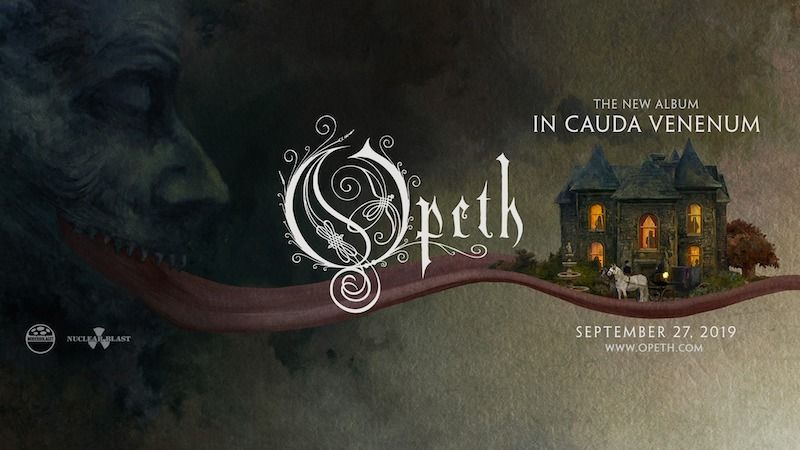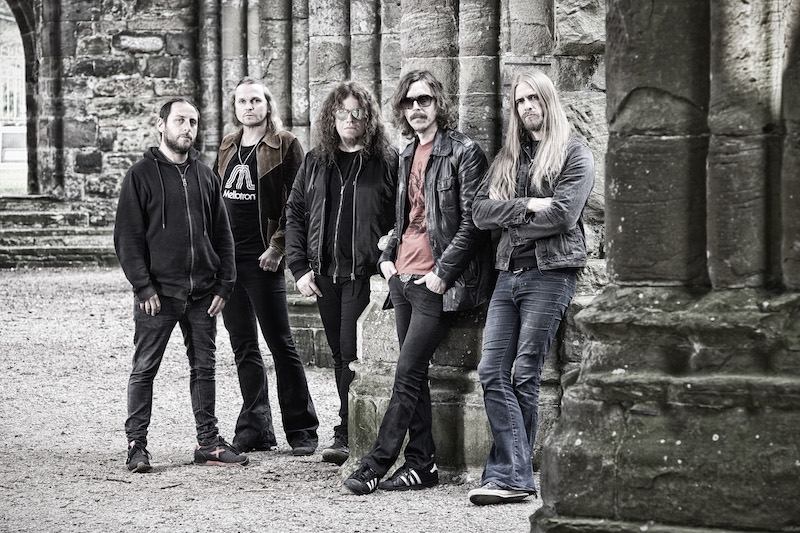OPETH
The new album
‘In Cauda Venenum’
out September 27
+ December 2019 Australian Tour
.

.
.
Sweden’s OPETH are preparing to release their most important record to date with »In Cauda Venenum«. Certainly, fans and critics will have their opinion, but few records in the Swedes’ oeuvre are as engaging, delicate, panoramic, intense, and musical as OPETH’s lucky thirteenth. Sporting a clever Travis Smith cover – replete with inside jokes and a nod to KING DIAMOND – a masterful Park Studios (The Hellacopters, Graveyard) production, OPETH’s usual five-star musicianship, and lyrics entirely in Swedish, »In Cauda Venenum« raises the bar markedly. While a record in Swedish is a first—there’s also an English version—for frontman and founding member Mikael Åkerfeldt, the 10 songs on offer feel and sound completely natural. As if years of listening to and being a fan of Swedish rock and hard rock has paid off. In a way, Opeth have come home. But the Swedish lyrics of the primary edition of »In Cauda Venenum« shouldn’t distract from the quality presented in OPETH’s new songs, the lot of which sneak up and take control after repeated listens. »In Cauda Venenum« is like that, tricky in its complicated simplicity, resourceful in its ability to charm with delightful if wistful melodies. Really, it’s just OPETH being OPETH.
“This is me,” Åkerfeldt says. “This is OPETH. I think by now fans will recognize—at least I hope they do—my writing style, our sound, what we do as a band. There are a lot of surprises on »In Cauda Venenum«, from the strings and Swedish samples to Fredrik’s [Åkesson] solos and the Swedish lyrics. But I knew I wanted a Latin title early on. I wanted a Latin title that would work for both versions. I didn’t want a Swedish title for the Swedish version and an English title for the English version. Since the death metal days of OPETH, I’ve always wanted a Latin title. Nothing ever worked. We had one Latin titled song on the first record though, ‘Requiem,’ the instrumental. I’ve always wanted something like that but it turned out harder than I thought when coming up with a title. With Latin, it can mean something really cool but look like shit or be very difficult to read. I couldn’t find a source for »In Cauda Venenum«. I thought, ‘Well, that looks cool.’ I remember Travis and I were working on the cover. We had this little insect, a scorpion, with the five heads of the band members. So, when I came across the phrase ‘In Cauda Venenum,’ I thought, ‘Well, that’s weird. Here we have a scorpion and »In Cauda Venenum« can relate to scorpions. Besides being a cool phrase, it works with the artwork, and the lyrics. In many ways, the stars aligned with the title.”
OPETH have traveled a long way since their humble beginnings in Huddinge, a small town south of Stockholm. Formed in 1990 by David Isberg (vocals) and Åkerfeldt (guitars) to create the “most evil band in the world,” OPETH would first require an actual band to partake in such a venomous venture. The duo enlisted Åkerfeldt’s former ERUPTION bandmates Anders Nordin (drums) and Nick Döring (bass). Not long after, a second guitarist, in the shape of Andreas Dimeo, was added to the line-up. Officially a five-piece, OPETH set out to corrupt the world (or at the very least Sweden) with their evil spells and black-hearted music. After a few gigs, the band splintered, with Dimeo and Döring exiting for personal reasons. Over the next two years, members left as quickly as they arrived, but it was the introduction of Peter Lindgren—on bass, then guitar—where things started to get serious. Even the departure of Isberg in 1992 didn’t heavily affect the newly established core of Åkerfeldt, Nordin, and Lindgren. They vowed to carry on as a trio and as OPETH. For the next few years, OPETH, still in its most nascent of stages, wrote and rehearsed religiously. It wasn’t until the re-entry of bassist Johan De Farfalla that OPETH was formally complete. Now, 13 records into their career and a few lineup changes to boot—Åkerfeldt is the only original member remaining—the band that started out of nothing has gone on to tour the world, sell more than two million records, and change the face of the heaviest of metals. »In Cauda Venenum« is OPETH’s finest hour.
“For us, at this stage with »In Cauda Venenum«, heaviness isn’t guitars tuned down with screaming vocals over the top,” says Åkerfeldt. “That’s not necessarily what I call ‘heavy’ music these days. I can listen to KoRn and say, ‘OK, that’s heavy.’ But it doesn’t really mean anything to me. I mean, I catch up on things in magazines or online. I read about bands that have the ‘heaviest record ever,’ and I’m not too impressed by that. OK, it’s cool but what does it say? What does it mean? It’s an impossible mission, to be the heaviest. That’s been done before. Over time, I got tired of that tag. Of course, when I was younger it meant everything to me. I was always on the pursuit for heaviness in my youth, trying to find the next level of heaviness. First it was death metal, then it was bands like MESHUGGAH, but heaviness is now more about emotions, heavy chord progressions, music that has feelings. Heaviness doesn’t mean MESHUGGAH anymore, although indeed they’re a fucking heavy band. I’m not trying to tap into that anymore.”
»In Cauda Venenum« was written surreptitiously by Åkerfeldt when he was scheduled for sabbatical after the »Sorceress« record cycle. Tired of Gantt charts, milestones, and other Project Management Office essentials presented by management, he told his handlers it was high time for break from OPETH and its many and varied responsibilities. They complied. Almost immediately, however, Åkerfeldt was holed up in his studio, Junkmail, writing music by himself without pressure or influence. Ultimately, the OPETH songman wanted a return to the old days—think »Orchid« through»Blackwater Park« when writing music was a creative endeavor not a factor in the business equation of being in a full-time, internationally recognized band. Described as more fun than spadework, the writing sessions were eventually exposed to the rest of the band and management. They were into Åkerfeldt’s newest creations but before anyone had a word in edgewise, »In Cauda Venenum« was, more or less, in the proverbial bag. The only thing that remained the same was Åkerfeldt writing and performing in his aging studio.
.
.
“The process, or the studio, for writing »In Cauda Venenum« was similar to »Sorceress«,” Åkerfeldt says. “I have the same stuff I’ve recorded on since »Watershed«. It’s all very outdated. I mean, nothing really works all that well, but it fits the purpose for what I’m doing with it. The writing, as always, is the same. The environment was the same. But the pressure was different. I got to write music that I felt was important. For »Sorceress«—which is a really good record—I felt I catered to what the other guys in the band wanted. I mean, with Axe, he really loves playing heavy metal music. So, I wrote two heavy metal songs. That was cool, but I didn’t want any kind of basic heavy metal on this record. I wanted something really elaborate, complex without sounding complex. I wanted it to be sing-along and melodic, but not gimmicky. The most fun part about writing »In Cauda Venenum« was the Swedish idea. That I’d write an entire OPETH record in Swedish. With that, I also wanted to make it grander, overblown and pompous, with strings and stuff. I actually had a really good time writing this record. For once, it was fun. A lot of fun.”
The idea to craft »In Cauda Venenum« entirely in Swedish originated while Åkerfeldt was driving his kids to school. He challenged the concept, weighed the risks and rewards, and ultimately came away with the direction he needed: OPETH’s next record would be entirely in Swedish. Precedent, after all, had been established. The special edition of 2008’s »Watershed« included a cover rendition of Swedish singer Marie Fredriksson’s ‘Den Ständiga Resan,’ on which sings Åkerfeldt sings in Swedish. Then again, an entire OPETH record in Swedish was not only a first-time event, but a brave marketing move to single out the band’s predominantly English-only fanbase and indeed, all but two countries—Sweden and Finland—do not speak, read, and understand Swedish. Undeterred, Åkerfeldt continued on, writing the scenic ‘Ingen Sanning Äralla’ (‘Universal Truth’) first. The rest of »In Cauda Venenum«, in Swedish, came as smoothly as a glass of glögg down the gullet. That an English version awaited was a no-brainer.
“I don’t expect us to conquer the world,” says Åkerfeldt. “We’re not going to be the next big thing now that we’re 45 and into our thirteenth record. So, as time has moved on, OPETH is becoming more and more for us. In a way, that makes the music and the record more pure. We’re not trying to get to the next level of popularity. We’re trying to get to the next level of creativity. So, making the record in Swedish was the spark. It got the music going. Down the line, I got anxious about the idea though. I started to think, ‘Maybe, they [the fans] won’t listen to it all because it’s in Swedish.’ I’ll admit I was chicken shit about not having an English version. So, I went ahead and made an English version as well. To me, the Swedish version is the main version, the most important version to me, and the version I want people to listen to first. Obviously, we wanted to give fans the choice though.”
Indeed, »In Cauda Venenum« will give fans a choice. Swedish or English. But maybe it’s not the language after all that bewitches. From the Tangerine Dream-like opener ‘Livet’s Trädgård’ (‘Garden of Earthly Delights’) to the epic closer ‘Allting Tar Slut’ (‘All Things Will Pass’), the new OPETH record is riveting, a musical score to an unreleased film, existing only in Åkerfeldt’s head as directed by Werner Herzog. To wit, tracks like ‘Svekets Prins’ (‘Dignity’), ‘Minnets Yta’ (‘Lovelorn Crime’), and ‘Banemannen’ (‘The Garroter’) are artful and melancholic yet high-spirited and uncomplicated in their sway forward. In many respects, it’s almost as if the film projector’s clicky hum is in the background while some shadowy figure sits in a chair smoking a cigarette. To put it actual terms, »In Cauda Venenum« resides somewhere between yet beyond Scott Walker’s »Scott 3«, THE BEATLES’ »Sgt. Pepper’s Lonely Hearts Club Band«, and JUDAS PRIEST’s »Sad Wings of Destiny«. It’s heavy mental, just with Swedish thoughts and motivations.
“I’m still discovering new artists that interest me,” Åkerfeldt says. “I also re-discover records I already have, like DEEP PURPLE’s »Stormbringer«, which is always a nice surprise. ‘I’m like, “Oh, that’s cool. Forgot about that song. I will listen to that two-three times now.’ There are some newer artists—that are obviously not prog or from the ‘70s—like Kate Bush. I’ve been aware of her for a very long time and I knew her songs, but it’s a bit like the ABBA situation: they’ve always been there, I know the songs, I’ve heard the songs, but I’ve never listened to the songs. Now, I play an ABBA record, and I’m like, “Fuck! That’s great!” Those songs became something else than what they were in my childhood. So, that happened to a couple of Kate Bush songs. Now, I listen to her. I’m also doing a lot of listening to jazz, courtesy of my girlfriend. As far as obscure artists, I got totally blown away by a British artist—completely unknown—named, Philamore Lincoln. I remember seeing the record, “The North Wind Blew South”, many years ago. I figured the cover was cool, because the cover reminded me of the back cover to our first record, »Orchid«, where we are standing in silhouette on the mountain. His cover is just him though. Eventually, I found a copy and thought it was amazing. It was Philamore Lincoln that got me into pop-rock music accompanied with strings.”
.
.
Originally slated to be recorded at Ghost Ward Recordings with producer/engineer David Castillo, OPETH opted for Park Studios with Stefan Boman instead. Nestled on a quiet backstreet in a nondescript neighborhood south of Stockholm, Park Studios was built in the 1970s by blues rock guru Acke Gårdebäck (of Acke & Gurra fame). While the studio has changed owners several times—now co-owned by Boman—it has retained its shag carpet and platform shoes allure by offering a bevy of original old-school recording tools, the very kind used on some of Åkerfeldt most cherished records. Plus, as it turns out Boman is of the same vision as the Opeth frontman when it comes to gear. Recordings for »In Cauda Venenum« commenced in November 2018 with Boman engineering and co-producing with Åkerfeldt. The production team started first with the drums, rhythm guitars, acoustic guitars, bass, and then tailed off the tracking with guitars, keyboards, lead guitars, and additional vocals. By Christmastide, Phase I of »In Cauda Venenum« was complete.
“There are really good studios in Stockholm,” says Åkerfeldt. “It really boiled downed to which studio I wanted to use. I was at dinner with Tobias [Forge] from Ghost and he said to me, ‘Have you been to Park Studios? You’d love that studio. It’s right up your alley. It’s a modern studio with old shit.’ I had totally forgotten about Park Studios. So, I called up Stefan [Boman] to ask him if he was available and if we could come down to look at the studio. He was like, ‘Yeah, great! Come over!’ Park Studios is 15 minutes from my house and 5 minutes from our rehearsal room, so it was perfect. Also, I’m not that into vintage gear where I must have a Marshall head from ’69 soldered in the month of March. As long as it sounds good that’s what I’m into. I like the idea of doing things for real though. Using someone’s expertise to get what you want. I want to sit with an amp, turn some knobs to get the sound I want. There’s physicality to it that I like. I got that Park Studios.”
Where OPETH go from here, it’s on tour in support of »In Cauda Venenum«. The previous touring cycle for »Sorceress« was two-years, so expectations for the Swedes ring the world into 2021, where they’ll play ‘Svekets Prins’ (‘Dignity’), ‘Hjärtat Vet Vad Handen Gör’ (‘Heart in Hand’), ‘Ingen Sanning Ärallas’ (‘Universal Truth’), ‘Banemannen’ (‘The Garroter’), and ‘Kontinuerlig Drift’ (‘Continuum’), are high. Clearly, once the bi-lingual brilliance of »In Cauda Venenum« is released, OPETH’s dedicated fanbase will be eager to hear, absorb, and experience the record in the flesh. As for what Åkerfeldt wants from his ardent followers is for them to appreciate the latest OPETH chapter in the same way they have 1996’s »Morningrise«, 2003’s »Damnation«, and 2014’s »Pale Communion«.
“Of course, I want everybody to love everything that we do,” Åkerfeldt says. “But it’s secondary to me. I can’t control that, and I don’t want to. I really don’t know what they’ll think about it. I don’t know how people listen to music these days. I don’t know how people feel about it music. I know how I listen to music. I provide the time to listen to music. I make time for music. I’m not doing something else while music is playing. I’d like everybody to focus on the new record. That’s no different from the OPETH records. I’ve always wanted people to focus on our music; not treat it as background music for daily chores, white noise, or whatever. If you want to get into this record, I’m hoping you’ll find, by our standards, something different.”
.
.
OPETH
AUSTRALIAN TOUR DATES
Adelaide – Tuesday 10 December – Thebarton Theatre
Perth – Wednesday 11 December – Astor Theatre
Melbourne – Friday 13 December – Palais Theatre
Sydney – Saturday 14 December – State Theatre
Brisbane – Sunday 15 December – Tivoli Theatre
Tickets
.
.
Follow OPETH
Website Facebook Twitter Instagram
.
.
AMNPLIFY – DB

My nickname is “The Amnplifier”. Why? Because around here my focus is on being a conduit for providing greater outcomes that people come here for. My day to day “work” is living in the moment, and I love helping others concentrate on finding their connection to themselves through their experiences.
Why start a music environment? The truth is I love music, I love writing, and I love life. I work with musicians every day, and I feel certain that I will be until they put me in the ground. I have been managing people in businesses of some sort for over thirty five years so along the way I have developed some “wisdom” from my regular and constant “observations”.
Amnplify your experience. That is what we want you to do here, and if you want to let me know why you do, or don’t, shoot me a message on Facebook.
Hope you enjoy yourself here and find something that hits you somewhere.











